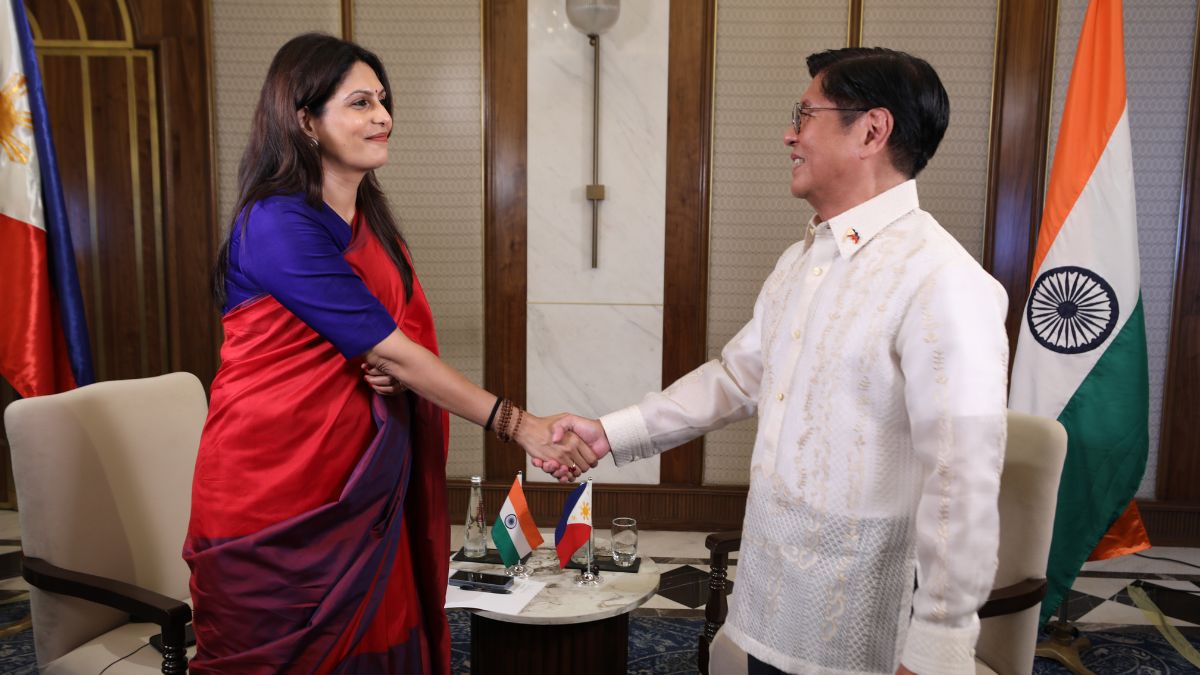Amid growing tensions in the Taiwan Strait, Philippines President Ferdinand “Bongbong” Marcos Jr has said his country “cannot stay out” if a conflict breaks out between China and Taiwan, adding that the Philippines would be “drawn into it” to protect its citizens.
Speaking exclusively to Firstpost Managing Editor Palki Sharma during his visit to India, Marcos highlighted the urgent need for strategic partnerships with like-minded nations including India to ensure regional security.
“If there is an all-out war, we will be drawn into it. We will have to go into Taiwan and bring our people home,” Marcos said, adding the Philippines’ large expatriate population in Taiwan.
WATCH: Exclusive: Philippine President on Ties with India, China, US & Trump | Marcos on Firstpost | N18G
Marcos’ comments come at a time of intensifying maritime tensions in the South China Sea and growing global concern over a potential military flashpoint in the Indo-Pacific.
Strengthening ties with India
Describing his meeting with Prime Minister Narendra Modi as “a new beginning, a new phase” in bilateral ties, Marcos said the strategic partnership between India and the Philippines has been “taken up a notch.” He praised India’s defence capabilities, especially its successful Operation Sindoor and the performance of the BrahMos missile system.
“We contacted counterparts in India. We wanted to know how it was used. The system worked very well, no doubt,” he said, confirming that the Philippines is in the process of procuring more BrahMos missiles.
“Everything is on the table,” he added, indicating interest in further purchases of jets and naval equipment.
While Marcos clarified that the Philippines is “not preparing for war,” he said that upgrading military hardware and ensuring interoperability with regional partners is vital. “We are only reacting to the challenges we are facing. Military exercises and cross-training are very important,” he said.
Impact Shorts
More ShortsA coalition of like-minded nations
Without directly naming China, Marcos stressed the importance of forming a global coalition of nations that respect international laws and reject unilateral changes to borders. “No one country can stand up for principles alone. We need a coalition,” he said.
On the idea of an ‘Asian NATO’, Marcos said ASEAN may not be sufficient to tackle all regional challenges. “One country cannot alone solve global challenges,” he said, adding that the Philippines welcomes India’s increasing presence in the Indo-Pacific.
US ties and Taiwan conflict
Marcos expressed confidence that the United States would remain committed to defending the Philippines, regardless of the outcome of the upcoming US presidential election. He described the US-Philippines alliance as “ironclad” and acknowledged former President Donald Trump’s role in coining that term.
Pressed on whether the Philippines would allow the US to use its military bases in a Taiwan contingency, Marcos said: “Why should we turn down partners who face the Chinese threat? We are not acting as a puppet state. It is our duty to defend our country.”
On China and regional diplomacy
While he acknowledged that Beijing was mentioned during his talks with Modi, Marcos said, “We are not against anyone; we are for defending our territory.” He added that China can be trusted “in the sense that they are clear about what they want,” but warned against allowing territorial disputes to dominate bilateral relations.
“We want to avoid a shooting war… a misunderstanding can blow up into something bigger. We want to cool rhetoric and keep communication lines open,” he said.
On Gaza and global crises
In rare comments on the war in Gaza, Marcos said the humanitarian toll is “unacceptable” and called for stronger international action. “The death, destruction and starvation should not be happening in this day and age. If the US stops sending weapons, there would be a big drop in attacks,” he said.
Reflecting on the global picture, Marcos said that “uncertainty is the worst thing for the economy” and advised nations to “negotiate hard” and remain agile in their diplomacy, especially when dealing with major powers like the US and China.
)